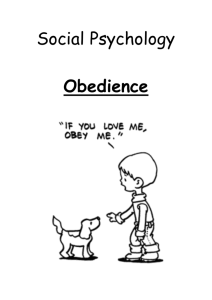Explanations of why people obey incl
advertisement
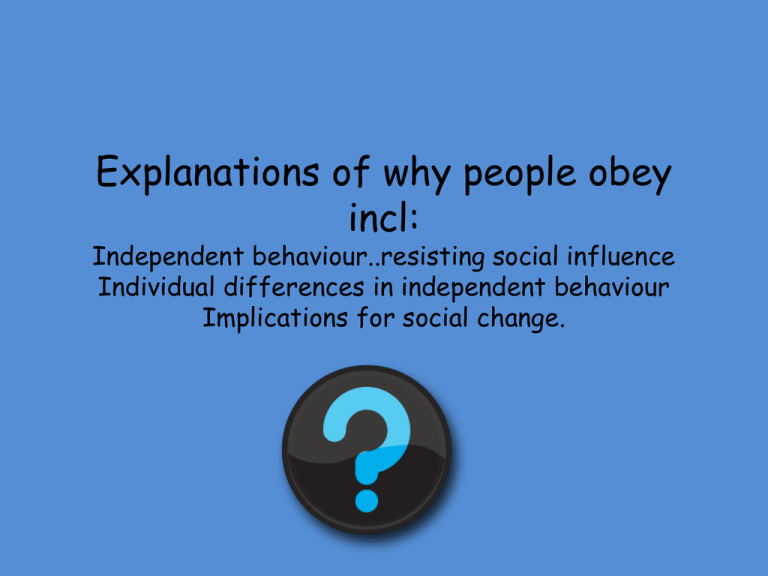
Explanations of why people obey incl: Independent behaviour..resisting social influence Individual differences in independent behaviour Implications for social change. Validity of obedience research. • Realism- Orne & Holland challenged the realism of the study, most people know to distrust ‘investigations’ thus distrust was the reason behind the shocking (sorry!) result. • Generalisability- Hofling et al (1966), Rank & Jacobson (1975) both real life and realistic, both with opposing results. • Obedience alibi-Eichman suggested he was doing his job• Milgram suggested this was as a result of the agentic shift However: Major Wilhelm Trapp offered soldiers to partake in other duties if they found the killing of Jews an uneasy duty. • Proximity- Well…the killers walked their victims to their death. This should have produced empathy! • Presence of allies- Several did not partake in the killings, but the majority did..in theory they should have said no! Review of learning. • Outline three obedience studies • Describe three evaluative points • Provide a counter argument showing Milgrams work was high in validity • Present evidence that Milgrams research was low in validity. • Describe two ethical issues and how Milgram attempted to deal with these issues. So why do people obey? • Gradual commitment- Having committed to one course of action i.e the shocks, it is difficult to say no to other requests aka the foot in the door effect. • Agentic Shift-When an individual moves from an autonomous (independent, thinking for themselves to an agentic state where they now see themselves as acting on behalf of another). • The role of Buffers- Cruise missile vs. the shooting an individual face to face. The immediacy of ones action is not present in the case of a cruise missile thus buffering allows for a willingness to obey. • The less well known defence-Justification. By giving individuals a justification dissenters in Milgrams study were able to find a reason aka justification for their actions (the experiment must continue, he said it was real important). So what do others say about (AO2) Milgram? Soldiers carried out Mandel(1998) suggested the explanations given are over simplified. Goldhagen(1996) suggested prejudice & discrimination as the major cause of Holocaust rather than obedience. killings over months, even years Milgams Ps only experienced ½ hour. Ps were adv no harm can come to learner..soldiers knew they were killing people. Can Agency theory really explain this behaviour? (AO2) (AO2) Milgram claimed his work offered situational explanation Mandel suggested: To say Just obeying ordersdistressing for those affected. Given the historical analysis of the event to suggest it was mere obedience is unjustified! Review of learning • Identify and explain two reasons why people obey • Give two criticisms of Milgrams explanations • Use your knowledge of why people obey to explain two examples of behaviour reported in the media that might be attributed to obedience. Independent behaviour..resisting social influence • Resisting pressure to conform • Resisting pressure to obey • • • • Insights from Aschs studies Having a ally makes them feel they are right (ISI) Moral considerations want to be liked (NSI) more likely to go with majority even in the case of cheating! Nonconformist personality usually unconcerned with social norms (Nail et al 2000). Intentionally choose to oppose often based on strong convictions. REMEMBER : INDEPENDENT BEHAVIOUR • • Insights from Milgrams work When victim could be seen or had allies obedience lowered…thus having consequence of actions & social support increase resistance. Moral considerations Behaviour based on moral principles (Think Heinz!) were more defiant in experiment . Those at lower/restricted levels of morality more obedient. Social heroism Putting oneself at risk in pursuit of justice. Can lead to loss of status, credibility and even freedom..(think Nelson Mandela!) Both successful Both display independent behaviours Both have a positive attributional style. • They resist influence/coercion • They have strong locus of control. • = money!! • = Status!! • = SUCCESS!! Implications for social change. • Conformity- Terrorism is a form of social change through persistence & conformity to zeitgeist. • Obedience- Disobedient models empower others (Civil rights, gay rights, votes for women!) • Independent behaviour research- Dissent can be effective and although disobedient can effect positive change (Ghandi, Rosa Parks). Review of learning • Describe four implications for social change from research into social influence. • For each implication outline a piece of supporting research. • When answering questions on this area you should…..outline the relevant psychology then illustrate clearly how this has been associated with social change.
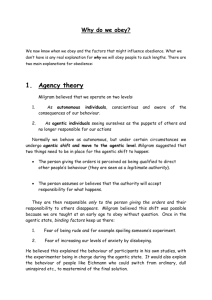
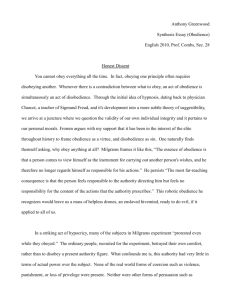

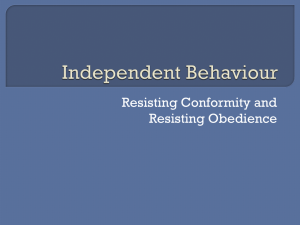
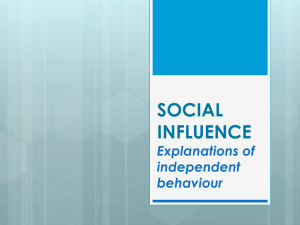
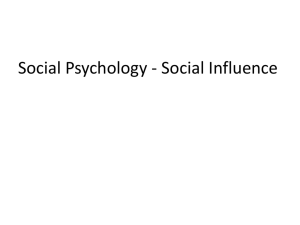
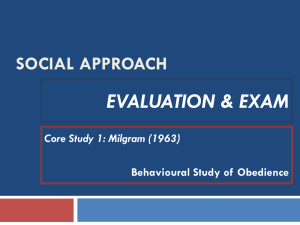
![milgram[1].](http://s2.studylib.net/store/data/005452941_1-ff2d7fd220b66c9ac44050e2aa493bc7-300x300.png)

